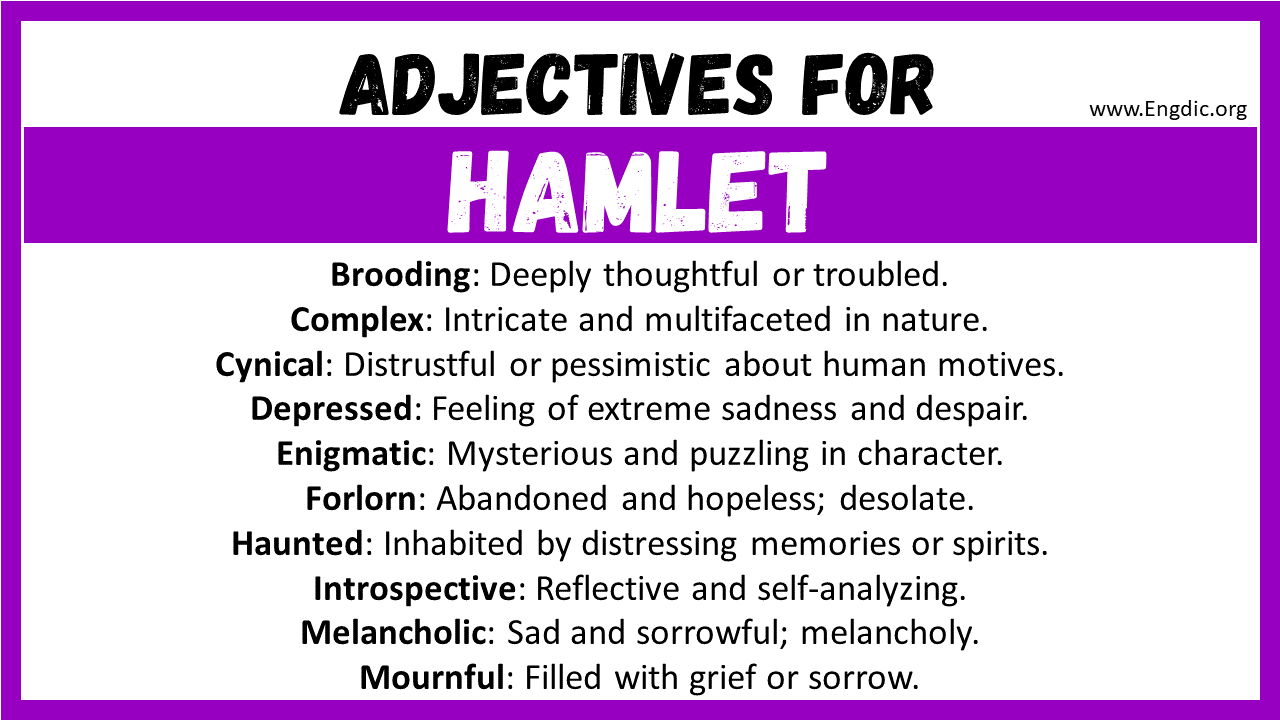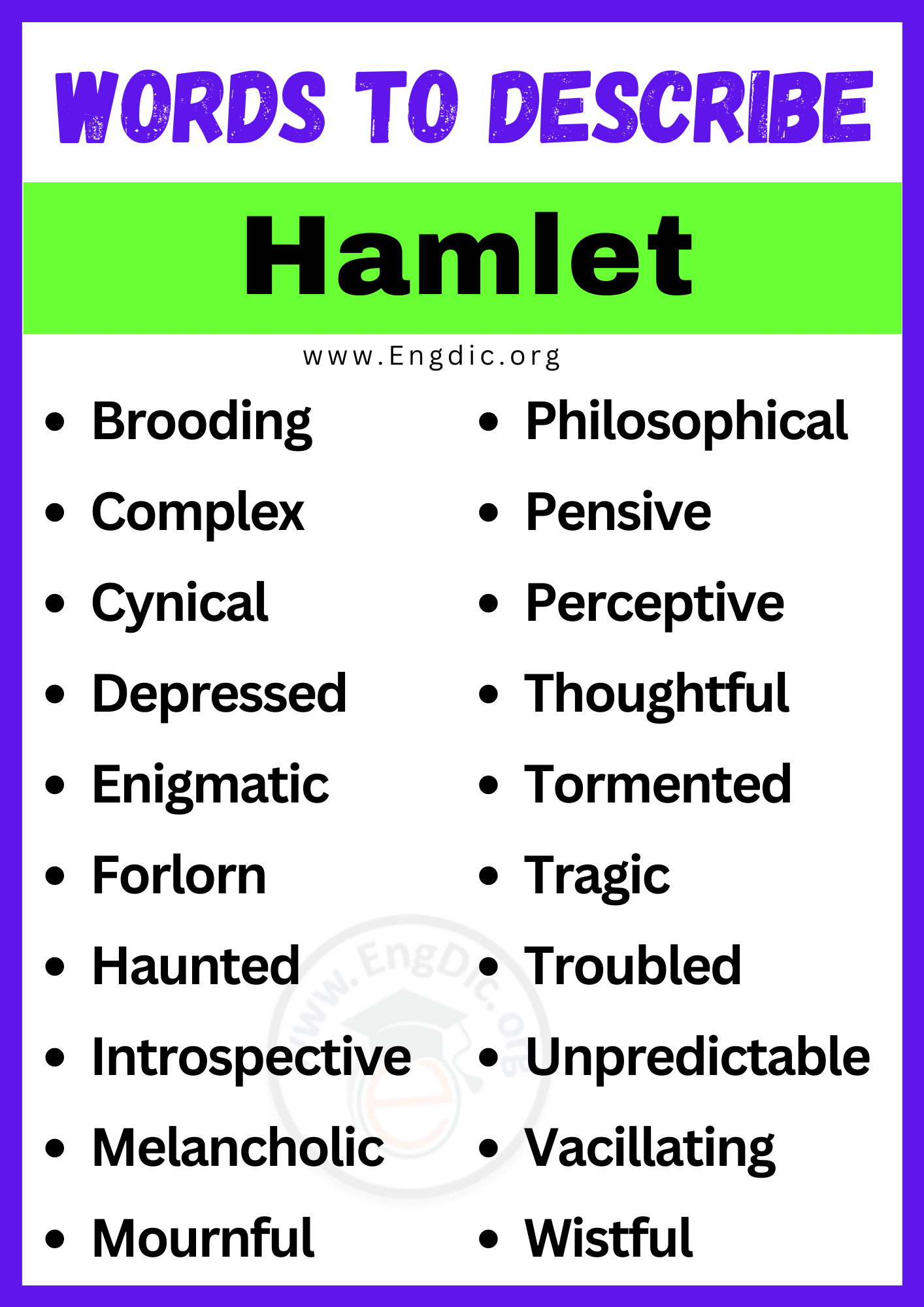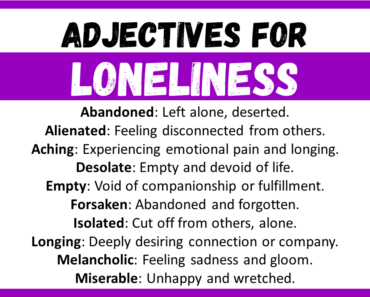Hamlet, the enigmatic protagonist of William Shakespeare’s timeless tragedy, stands as a symbol of profound complexity and conflicting emotions. Portrayed as a brooding prince, he grapples with inner turmoil, doubt, and vengeance, captivating audiences for centuries. Unraveling the essence of Hamlet requires a careful selection of words that encompass his multifaceted nature. From “melancholic” and “introspective” to “cunning” and “passionate,” each word contributes to a vivid tapestry that reveals the intricate layers of this iconic character, leaving an indelible mark on literary history.
Adjectives for Hamlet
Here are the 20 Most Popular adjectives for Hamlet:
- Brooding
- Complex
- Cynical
- Depressed
- Enigmatic
- Forlorn
- Haunted
- Introspective
- Melancholic
- Mournful
- Philosophical
- Pensive
- Perceptive
- Thoughtful
- Tormented
- Tragic
- Troubled
- Unpredictable
- Vacillating
- Wistful
Adjectives to Describe Hamlet’s Character:
- Melancholic
- Brooding
- Conflicted
- Anguished
- Cerebral
- Introspective
- Perceptive
- Complex
- Tormented
- Philosophical
Words to Describe Hamlet with Meanings
- Brooding: Deeply thoughtful or troubled.
- Complex: Intricate and multifaceted in nature.
- Cynical: Distrustful or pessimistic about human motives.
- Depressed: Feeling of extreme sadness and despair.
- Enigmatic: Mysterious and puzzling in character.
- Forlorn: Abandoned and hopeless; desolate.
- Haunted: Inhabited by distressing memories or spirits.
- Introspective: Reflective and self-analyzing.
- Melancholic: Sad and sorrowful; melancholy.
- Mournful: Filled with grief or sorrow.
- Philosophical: Contemplative and inclined to ponder life’s mysteries.
- Pensive: Engaged in deep or serious thought.
- Perceptive: Observant and insightful.
- Thoughtful: Considerate and reflective in actions.
- Tormented: Experiencing extreme mental or emotional pain.
- Tragic: Marked by sorrowful events and consequences.
- Troubled: Disturbed or distressed emotionally.
- Unpredictable: Difficult to anticipate or foresee.
- Vacillating: Indecisive and wavering in choices.
- Wistful: Longing or yearning with a touch of sadness.
Example Sentences for Hamlet Adjectives
- The brooding skies hinted at an impending storm.
- His complex personality baffled those around him.
- Her cynical comments left everyone feeling disheartened.
- After the loss, she felt deeply depressed.
- The enigmatic stranger intrigued the curious townsfolk.
- The forlorn puppy waited at the shelter for adoption.
- The old mansion was said to be haunted.
- His introspective nature led to insightful conclusions.
- The poet’s verses evoked a melancholic mood.
- The mournful melody stirred emotions within the crowd.
- The philosopher was known for his philosophical musings.
- He sat alone in the park, looking pensive.
- Her perceptive observations helped solve the mystery.
- She wrote a thoughtful note to express her gratitude.
- The character in the play was tormented by guilt.
- The story ended with a tragic twist of fate.
- He had a troubled past, but he changed for the better.
- The outcome of the match was unpredictable till the end.
- The vacillating leader struggled to make a decision.
- The old photographs made her feel wistful for her youth.
Explore More Words:
FAQ’s
How to describe Hamlet in writing?
Hamlet can be described as a brooding and introspective character, torn between conflicting emotions and philosophical contemplations.
What are the good qualities of Hamlet?
Hamlet possesses intelligence, perceptiveness, and a sense of justice, which make him a compelling and complex protagonist.
Why is Hamlet a hero?
Hamlet’s heroism lies in his pursuit of truth, his courage to confront corruption, and his willingness to sacrifice for justice, despite his inner struggles.








